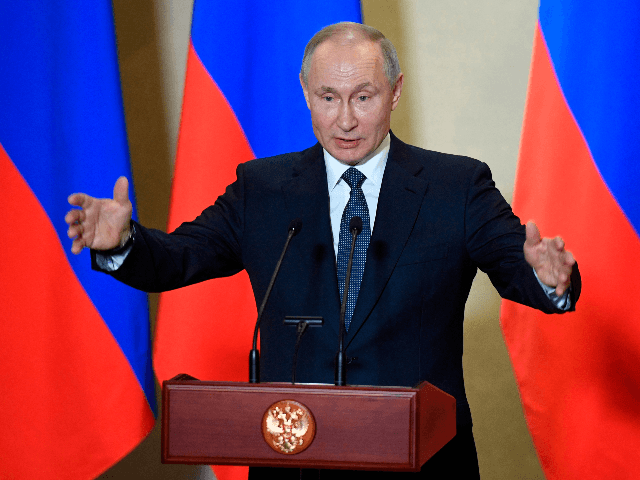Russian President Vladimir Putin warned other nations not to cross Russia’s “red lines” in his 17th annual state of the union address, delivered to the Russian parliament Wednesday.
“I have to say this. We have patience, responsibility, professionalism, confidence in ourselves and our rightness, as well as common sense when making any decision — but I hope that nobody would decide to cross the so-called red line in relations with Russia, and we will define those on our own in every individual case,” Putin said, as reported by the state-run Tass news agency.
Putin claimed Russia nevertheless wants to have good relations with every nation that manages to avoid stepping across any of his undefined red lines and triggering “swift and harsh” Russian retaliation.
“We do not want to burn any bridges, but if someone perceives our good intentions as indifference or weakness and intends to blow up these bridges, then [they] must know that Russia’s response will be asymmetric, swift and harsh,” he said.
“Whoever threatens our essential security interests will regret it like they’ve never regretted anything before,” Putin warned.
Radio Free Europe (RFE) cited analysts who said Putin’s 2021 address was a bit less overtly belligerent than usual, as he spent less time touting unstoppable Russian super-weapons and made no major declarations about tensions with Ukraine — but given Putin’s history, the lack of rhetorical theatrics might be a bad sign of imminent hostile action.
One disturbing aspect of the address was Putin linking Ukraine with Belarus, where Russian-supported dictator Alexander Lukashenko has resisted international pressure to step down after stealing the last election.
The U.S. on Monday announced sanctions against nine Belarusan companies for human rights violations against opponents of the Lukashenko regime. Last week the Russians claimed to have foiled a coup attempt against Lukashenko, and he accused the United States of helping to organize “an assassination attempt against the president and his children.”
Putin’s connection of the situations in Ukraine and Belarus suggests the shape of his “red lines,” and a warning that both of those countries — and perhaps the rest of the old Soviet empire — lie firmly within them.
Other Russia experts speculated Putin was putting on a show of nationalist confidence and militarist bravado to alleviate domestic political concerns, as he sought to depict Russia as a still-dangerous power that commands attention on the world stage.
The New York Times (NYT) raised the possibility that the aging Russian leader is becoming dangerously erratic as he visualizes his place in history as one of his country’s most consequential leaders:
Still, it was too early to tell whether Mr. Putin, 68, was pulling back from the brink. Now in his third decade in power, he appears more convinced than ever of his special, historic role as the father of a reborn Russian nation, fighting at home and abroad against a craven, hypocritical, morally decaying West.
“This sense of superiority mixed with arrogance gives him a feeling of power, and this is dangerous,” said Tatiana Stanovaya, a Russian analyst who has studied Mr. Putin for years. “When you think you are more powerful and more wise than everyone else around you, you think you have a certain historical mandate for more wide-ranging action.”
The NYT noted grimly that Ukrainian President Volodymyr Zelensky addressed his own nation Tuesday evening and warned hostilities could be imminent, as Russia’s military buildup provides “all the preconditions for escalation.”
“Does Ukraine want war? No. Is it ready for it? Yes. Our principle is simple: Ukraine does not start a war first, but Ukraine always stands to the last man,” Zelensky declared.
Putin did not mention another source of tension with the West, the incarceration and declining health of opposition leader Alexei Navalny, during his address — Putin has a policy of never referring to Navalny by name — but on Wednesday, Russian police raided the offices of Navalny’s anti-corruption organization and arrested several of his key supporters and allies, including spokeswoman Kira Yarmysh and top assistant Lyubov Sobol.
Navalny supporters were able to turn out impressive crowds for protests during Putin’s speech. The Russian Interior Ministry estimated 6,000 demonstrators in Moscow and 4,500 in St. Petersburg, but independent observers said the numbers were vastly higher. Mass detentions were reported as police moved to break up the demonstrations.

COMMENTS
Please let us know if you're having issues with commenting.